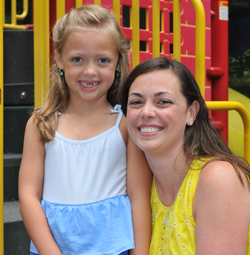Ending Treatment
 Ending treatment for cancer in children is, for many families and patients, a time of great joy. It is associated with "success" and with relief at no longer having to endure the many treatments and intense schedules that have developed. At the same time, families face new uncertainties. There are new requirements for medical monitoring and adjustments to a "new normal" life. And now that active treatment is ending, the hospital staff and the other families fighting cancer who have become essential support are no longer involved on a regular basis.
Ending treatment for cancer in children is, for many families and patients, a time of great joy. It is associated with "success" and with relief at no longer having to endure the many treatments and intense schedules that have developed. At the same time, families face new uncertainties. There are new requirements for medical monitoring and adjustments to a "new normal" life. And now that active treatment is ending, the hospital staff and the other families fighting cancer who have become essential support are no longer involved on a regular basis.
Different families react differently to this stage. Even members of the same family can find themselves reacting differently to the end of treatment. Children, particularly younger children, rarely experience anything other than joy at being done with treatment, while parents often have concerns about how best to monitor and care for their child on their own.
One of the most common reactions to ending treatment, particularly for parents, is a fear that the cancer will come back. This happens because while in treatment, there was a protocol, medication, and frequent monitoring. Without the formal therapies and frequent testing, parents may feel they are not actively fighting the disease. It is important to remember that treatment has ended and monitoring has been reduced based on experience that it is now safe to do so.
Challenges and Questions
The pediatric oncology team recognizes the challenges families face during this transition period. Scheduling a visit at the end of therapy during which parents can ask the team their own questions can be very helpful in providing guidance for what to expect as you and your child move forward. Following are some questions that parents may ask when treatment is ending:
- How often will we need to come back to the oncology clinic for check-ups, lab tests, scans, etc? How long will we continue to return for follow-up care?
- Do we call the oncology team for routine illnesses and "well child" care? If not, how is that care managed?
- What is the chance of the cancer coming back? If it does, when is the most likely time period? What are the most likely symptoms of the cancer returning?
- How long will my child need to take Bactrim, Dapsone or Pentamidine (or any other medication the child may be taking)?
- When can my child's central venous access device be removed? How is that done?
- When can my child resume his or her immunizations? Are flu shots recommended?
- What if my child has problems in school following therapy? What school problems might I expect for my child? Will the treatment team or hospital education consultant still be available to help with school adjustment or accommodation issues?
- What is the long-term follow up plan for my child? Is there a written summary of treatment and follow-up you can give me?
- Are there resources to help us transition to adult-based care when my child becomes a young adult?
Join our mailing list
Stay up to date on the latest news, research breakthroughs and stories of hope.
